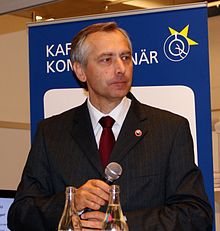Ján Figeľ: Difference between revisions
m MInor fixes/links using |
No edit summary |
||
| Line 50: | Line 50: | ||
Following his hearing Figeľ received broad but not especially enthusiastic support from MEPs, with the [[Party of European Socialists|PES]] describing his performance as "basically satisfactory" and "enough to give him our support", but criticising him for "not distancing himself from the Conservative [[Christianity|Christian]] position as the only cultural tradition." |
Following his hearing Figeľ received broad but not especially enthusiastic support from MEPs, with the [[Party of European Socialists|PES]] describing his performance as "basically satisfactory" and "enough to give him our support", but criticising him for "not distancing himself from the Conservative [[Christianity|Christian]] position as the only cultural tradition." |
||
Figeľ announced his resignation from the Commission on 21 September 2009, following his election as the leader of Christian Democratic Movement in Slovakia. He was replaced by [[Maroš Šefčovič]] on 1 October 2009. |
Figeľ announced his resignation from the Commission on 21 September 2009, following his election as the leader of Christian Democratic Movement in Slovakia<ref>http://spectator.sme.sk/articles/view/36617/2/ec_representative_leaves_post_for_kdh_chair.html</ref>. He was replaced by [[Maroš Šefčovič]] on 1 October 2009. |
||
From July 2010 he is minister for Transport, Post and Telecommunication |
From July 2010 he is minister for Transport, Post and Telecommunication |
||
==External links== |
==External links== |
||
{{Reflist}} |
|||
* [http://ec.europa.eu/commission_barroso/sefcovic/index_en.htm Official website] |
* [http://ec.europa.eu/commission_barroso/sefcovic/index_en.htm Official website] |
||
Revision as of 10:59, 22 November 2010
Ján Figeľ | |
|---|---|
 | |
| European Commissioner for Education, Training, Culture and Youth | |
| In office 1 January 2007 – 1 October 2009 | |
| President | José Manuel Barroso |
| Preceded by | Himself (Education, Training, Culture and Multilingualism) |
| Succeeded by | Maroš Šefčovič |
| European Commissioner for Education, Training, Culture and Multilingualism | |
| In office 22 November 2004 – 1 January 2007 | |
| President | José Manuel Barroso |
| Preceded by | Viviane Reding Dalia Grybauskaitė (Education and Culture) |
| Succeeded by | Himself (Education, Training, Culture and Youth) Leonard Orban (Multilingualism) |
| European Commissioner for Enterprise and Information Society | |
| In office 1 May 2004 – 22 November 2004 | |
| President | Romano Prodi |
| Preceded by | Erkki Liikanen |
| Succeeded by | Günter Verheugen (Enterprise and Industry) Viviane Reding (Information Society and Media) |
| Personal details | |
| Born | 20 January 1960 Čaklov, Czechoslovakia (now Slovakia) |
| Political party | Christian Democratic Movement |
| Alma mater | Technical University of Košice Georgetown University University of Antwerp |
Ján Figeľ (born 20 January 1960) is a Slovak politician, previously European Commissioner for Education, Training & Culture. His area of responsibility also covered sport, youth, and relations with civil society.
Early career
Born in Čaklov, Figeľ studied power electronics at the Technical University of Košice for five years, beginning in 1978. From 1983 he worked as a research and development scientist for ZPA Prešov. He joined the conservative Christian Democratic Movement (KDH) in 1990 and was elected to the National Council of the Slovak Republic in 1992, serving on its Foreign Affairs Committee and becoming a member of Slovakia's delegation to the Council of Europe a year later.
In 1998 Figeľ left his parliamentary seat and was appointed State Secretary of the Ministry of Foreign Affairs. Unlike most of his colleagues in the European Commission, he never rose to a cabinet-level position, but led Slovakia's accession negotiations with the European Union until 2003. He also represented the Slovak government in the European Convention which drafted the European Constitution. He returned to the National Council in 2002 where he chaired its Foreign Affairs Committee, stepping down in 2004 to take up his Commission post.
From 1995 to 2000 Figeľ lectured in international relations at Trnava University. He is married with four children.
European Commission
Figeľ served briefly in the Prodi Commission. From Slovakia's accession to the European Union on 1 May 2004 to the confirmation of the Barroso Commission later that year he jointly held the Enterprise and Information Society portfolio, sharing his role for most of that period with the Finnish appointee Olli Rehn, also new to the job. The Slovak government nominated Figeľ for the incoming Barroso Commission which took office on 22 November 2004. His appointment to the Education, Training, Culture and Multilingualism portfolio was regarded as something of a disappointment. Figeľ himself said that the role was not his "primary choice", but he accepted it "as a challenge".
From 1 January 2007, in the enlarged Barroso Commission after the accession of Bulgaria and Romania to the European Union, responsibility for multilingualism is transferred to Commissioner for Multilingualism, Romanian Leonard Orban.
Selection hearing
Questioned by the European Parliament, Figeľ said that the goal of a true European labour market would require more investment in education, professional training, mobility, and simpler Europe-wide acknowledgment of qualifications. He said that the promotion of education was vital to the aims set out in the Lisbon Strategy.
He told MEPs that he would like all children in the EU to be taught at least two foreign languages at school, and also stressed his support for UNESCO.
Following his hearing Figeľ received broad but not especially enthusiastic support from MEPs, with the PES describing his performance as "basically satisfactory" and "enough to give him our support", but criticising him for "not distancing himself from the Conservative Christian position as the only cultural tradition."
Figeľ announced his resignation from the Commission on 21 September 2009, following his election as the leader of Christian Democratic Movement in Slovakia[1]. He was replaced by Maroš Šefčovič on 1 October 2009.
From July 2010 he is minister for Transport, Post and Telecommunication
External links
